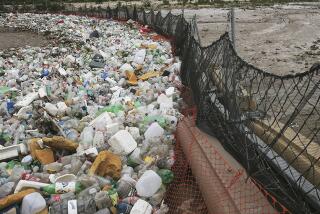Sewer Hook-Up Ban Is Ordered by City : Permits for Northern Tier Are Barred Because of Troubles at Pump Station
- Share via
Facing the prospect of too much sewage flowing into too few pumps, San Diego City Manager John Lockwood on Friday ordered a ban on any further permits for hook-ups into sewers leading to problem-plagued Pump Station 64 in Sorrento Valley.
Lockwood ordered the ban after city records showed the number of hook-up permits granted in recent months could mean the total amount of sewage flowing to the troubled pump station would exceed its capacity.
State water pollution officials have ruled the city can’t allow any more than 20.5 million gallons to flow each day into the station, which has repeatedly spilled raw sewage into Los Penasquitos Lagoon and into the ocean.
But city officials say they realized late last week that, with the number of outstanding hook-up permits, the amount of sewage flowing to the pump station could theoretically reach as much as 21 million gallons a day--500,000 gallon more than the facility’s capacity.
Lockwood said those numbers prompted him to slap the ban on sewage hook-ups in the Station 64 service area until the city installs larger pumps at the facility in November. Developers in the service area--which includes communities like Penasquitos and Sorrento Valley in the city’s booming northern tier--will be allowed to build but won’t be allowed to tap into the sewage system until the improvements at Station 64 are complete.
Lockwood added Friday that he doesn’t expect that his ban will deter the normal pace of construction.
Since it usually takes six months between the time a developer picks up his permit and finally completes his new home or business, it is unlikely that all of the outstanding permits will be acted on before the November deadline.
“If everybody built out as they expect to build out, the plant can handle that,” said Lockwood. “It just can’t handle any more.”
On Jan. 24, the regional Water Quality Control Board imposed a $300,000 fine against the city--the stiffest penalty ever assessed by the agency--for a 1.5-million gallon sewage spill at the station on Thanksgiving. The spill was the 59th in the last seven years.
City officials have blamed the recent spills on mechanical or human error, but water pollution administrators say they believe the problem is that Station 64 is too small to accommodate San Diego’s burgeoning growth.
Under pressure from state officials, the city has embarked on an ambitious plan to expand the station’s capacity. The addition of larger pumps in November will increase capacity to 26.5 million gallons a day, and a new parallel force main to be installed in June 1988 will bring the capacity to 35 million gallons a day.
In the meantime, water pollution officials have ruled that the city must cut off sewage hook-ups when the station is theoretically at capacity.
Yvonne Rehg, spokeswoman for the city’s Water Utilities Department, said Friday that it was not until last week that water officials realized the number of current outstanding permits would trigger the ban.
Calculations this week revealed that the permits were for 5,818 dwelling units and represented an estimated flow of 1.6 million gallons a day, said Rehg. Added to the sewage flowing currently to Station 64, the permit represented a theoretical maximum of 21 million gallons daily, she said.
Of the 5,818 dwelling units with permits, Rehg said, water officials expect 3,730 to be completed and hooked up to the sewers. That alone, she added, would bring the flow to 20.4 million gallons--only 100,000 gallons shy of the limit.
“We’re cutting it close,” said Rehg.
Lockwood said, however, he expects no problem. He said work to install the new larger pumps at Station 64 is running ahead of schedule and the capacity will be expanded in time to provide a comfortable margin when the new sewage starts flowing to the Sorrento Valley facility.
An aide to Councilwoman Abbe Wolfsheimer, who has spearheaded council efforts to improve the pump station, said Wolfsheimer is “extremely pleased” with Lockwood’s ban.
“He showed a true understanding and is taking all precautionary measures to safeguard the compliance with the regional Water Quality Control Board,” said Joann Johnson.
More to Read
Sign up for Essential California
The most important California stories and recommendations in your inbox every morning.
You may occasionally receive promotional content from the Los Angeles Times.













